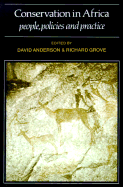Book contents
- Frontmatter
- Contents
- Preface
- List of contributors
- Introduction: The scramble for Eden: past, present and future in African conservation
- Part One Conservation ideologies in Africa
- Part Two Wildlife, Parks and Pastoralist
- Part Three Conservation priorities and rural communities
- Part Four Consequences for conservation and development
- Introduction
- 13 The political reality of conservation in Nigeria
- 14 Settlement, pastoralism and the commons: the ideology and practice of irrigation development in Northern Kenya
- 15 Approaches to water resource development, Sokoto Valley, Nigeria: the problem of sustainability
- 16 State policy and famine in the Awash Valley of Ethiopia: the lessons for conservation
- Index
Introduction
Published online by Cambridge University Press: 04 April 2011
- Frontmatter
- Contents
- Preface
- List of contributors
- Introduction: The scramble for Eden: past, present and future in African conservation
- Part One Conservation ideologies in Africa
- Part Two Wildlife, Parks and Pastoralist
- Part Three Conservation priorities and rural communities
- Part Four Consequences for conservation and development
- Introduction
- 13 The political reality of conservation in Nigeria
- 14 Settlement, pastoralism and the commons: the ideology and practice of irrigation development in Northern Kenya
- 15 Approaches to water resource development, Sokoto Valley, Nigeria: the problem of sustainability
- 16 State policy and famine in the Awash Valley of Ethiopia: the lessons for conservation
- Index
Summary
Environmental crisis and demographic collapse are scarcely new to Africa. They are as old as the continent's ascertainable history. Memories of famine are among the more reliable sources which historians can use for dating the pre-colonial past. Africa's indigenous productive practices are premised on the inevitability of recurrent drought. Its ethnicity is generally based on the cultural elaboration of expert knowledge of local botany and climatic variation. In many regions local aesthetics have been moulded by the greater chances of survival one enjoys by being fat. Traditional political thought is shot through with the obligation of the fat to give succour to the famished, and with the need of the thin to give service in return. The new elements of Africa's contemporary crisis are the sustained population growth of recent years, the power of contemporary sovereign states and the demands of the international economic order.
In pre-colonial Africa there was an immensely varied relationship between environmental constraint and the human politics of survival. At one extreme, established polities could be destroyed by the collapse of their productive environment. Such seems to have been the fate of the Zimbabwe civilisation in the fifteenth century, and of a sucession of chiefships in the Angola hinterland throughout the pre-colonial era.
Information
- Type
- Chapter
- Information
- Conservation in AfricaPeoples, Policies and Practice, pp. 271 - 276Publisher: Cambridge University PressPrint publication year: 1988
